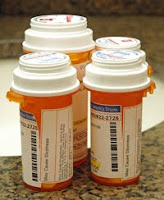Well surprise, surprise–pills in the medicine cabinet pose a greater threat to children than household cleaners. This from a recent U.S. Centers for Disease Control and Prevention report stating that two out of every three children showing up at emergency rooms for poisoning were due to ingesting prescription drugs. And you thought those orange canisters were child proof.
Poisonings being the number one health hazard for children makes it prudent to know which household items are causing the greatest harm. Medications by far lead the pack–they are twice as likely to cause pediatric poisoning as cleaning substances, pesticides, personal care products and other toxic household substances.
Says Jay L. Schauben, a pharmacist and director of the Florida Poison Information Center in Jacksonville, Florida,
“Normally what occurs when someone is taking medicine on a chronic basis, they’ll leave it out. Any pills left out are within the grasp and reach of a child. Some of the medicine can look like candy. Some of the cough syrupsare flavored and taste good. You can sort of see how that would be a disaster waiting to happen.
The drugs children most often overdose on are over-the-counter (OTC) medications, with 10% of all poisonings in children under five coming from common analgesics like Tylenol or Motrin. Don’t forget that very young children put things in their mouths all the time–they are sampling their environment. When common OTC meds are left out, children will likely want to try them. Further, when hosting guests, always remember that they might be on medications, too, so keep an eye out for meds left out in guest bathroom.
Fortunately, not all kids that swallow pills overdose: only 26 deaths from 1.3 million poisonings in children 5 or younger were reported in 2008.
The best thing parents can do if they suspect medication poisoning, experts say, is to first call the Poison Help hotline: 800-222-1222. That number will connect them to the Poison Control Center nearest them.
“The only time you want to call 911 first is if the child is unarousable, the child is having difficulty breathingor the child is having convulsions or seizures,” Schauben said.
According to another expert, “More than 95 percent of the time, a child will be able to stay at home. I don’t think just because a child got into something, the parents should automatically pack them into the car and take them to the emergency room. We can determine who needs to go to an ER or not.”
Once again,
Poison Help hotline: 800-222-1222.















